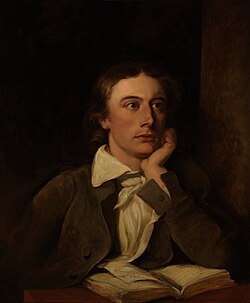John Keats Quote
Call the world, if you please, "the Vale of Soul Making". Then you will find out the use of the world....There may be intelligences or sparks of the divinity in millions -- but they are not Souls till they acquire identities, till each one is personally itself.Intelligences are atoms of perception -- they know and they see and they are pure, in short they are God. How then are Souls to be made? How then are these sparks which are God to have identity given them -- so as ever to possess a bliss peculiar to each one's individual existence. How, but in the medium of a world like this?This point I sincerely wish to consider, because I think it a grander system of salvation than the Christian religion -- or rather it is a system of Spirit Creation...I can scarcely express what I but dimly perceive -- and yet I think I perceive it -- that you may judge the more clearly I will put it in the most homely form possible. I will call the world a school instituted for the purpose of teaching little children to read. I will call the human heart the hornbook used in that school. And I will call the child able to read, the soul made from that school and its hornbook.Do you not see how necessary a world of pains and troubles is to school an intelligence and make it a soul? A place where the heart must feel and suffer in a thousand diverse ways....As various as the lives of men are -- so various become their souls, and thus does God make individual beings, souls, identical souls of the sparks of his own essence.This appears to me a faint sketch of a system of salvation which does not affront our reason and humanity...
Call the world, if you please, "the Vale of Soul Making". Then you will find out the use of the world....There may be intelligences or sparks of the divinity in millions -- but they are not Souls till they acquire identities, till each one is personally itself.Intelligences are atoms of perception -- they know and they see and they are pure, in short they are God. How then are Souls to be made? How then are these sparks which are God to have identity given them -- so as ever to possess a bliss peculiar to each one's individual existence. How, but in the medium of a world like this?This point I sincerely wish to consider, because I think it a grander system of salvation than the Christian religion -- or rather it is a system of Spirit Creation...I can scarcely express what I but dimly perceive -- and yet I think I perceive it -- that you may judge the more clearly I will put it in the most homely form possible. I will call the world a school instituted for the purpose of teaching little children to read. I will call the human heart the hornbook used in that school. And I will call the child able to read, the soul made from that school and its hornbook.Do you not see how necessary a world of pains and troubles is to school an intelligence and make it a soul? A place where the heart must feel and suffer in a thousand diverse ways....As various as the lives of men are -- so various become their souls, and thus does God make individual beings, souls, identical souls of the sparks of his own essence.This appears to me a faint sketch of a system of salvation which does not affront our reason and humanity...
Related Quotes
To begin to know ourselves we must have sincere conversations with ourselves as if with a good friend. We must answer without reserve, listen without judgement, and accept without condition. That is s...
God whispered, "You endured a lot. For that I am truly sorry, but grateful. I needed you to struggle to help so many. Through that process you would grow into who you have now become. Didn't you know...
About John Keats
Keats had a style "heavily loaded with sensualities", notably in the series of odes. Typically of the Romantics, he accentuated extreme emotion through natural imagery. Today his poems and letters remain among the most popular and analysed in English literature – in particular "Ode to a Nightingale", "Ode on a Grecian Urn", "Sleep and Poetry" and the sonnet "On First Looking into Chapman's Homer". Jorge Luis Borges named his first time reading Keats an experience he felt all his life.
